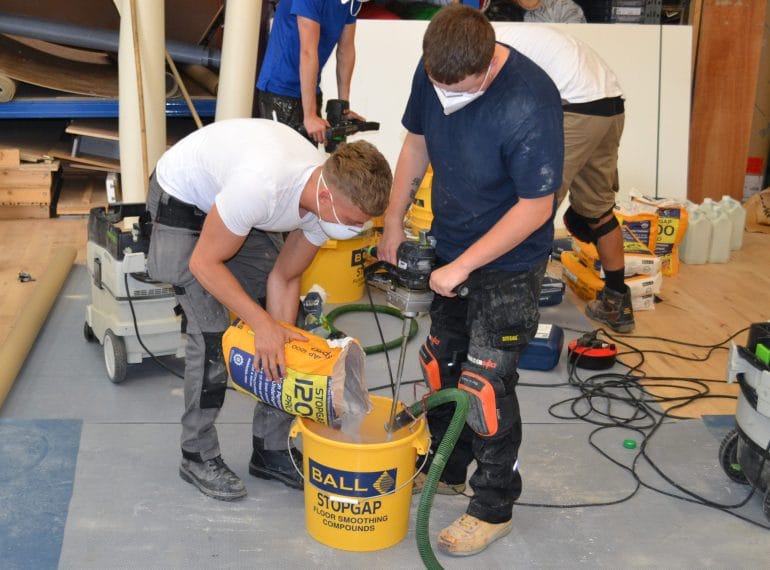Floorlaying Apprenticeships Facts
CFA Training Manager Shaun Wadsworth talks about the importance of floorlaying apprenticeships.

Increasing the number of available floorlaying apprenticeships is a key focus for the Contract Flooring Association (CFA) and is essential in order to provide a constant and correctly trained source of skills and labour for our industry. So much so that in 2021 the training arm of the CFA, the Flooring Industry Training Association (FITA), began delivering apprenticeships alongside private training courses. For CFA members, all of the information below, plus specific contractor training support, is just one of the many benefits of becoming a member of your industry trade association.
Apprenticeships are a key focus in helping to battle the skills shortages that we are facing because of an ageing workforce and employing an apprentice can be linked directly to improving the productivity of a business. With this in mind, the CFA is constantly working with industry representatives to maintain, develop and agree apprenticeship standards and frameworks which meet the requirements of the industry, while also offering an attractive career path to young people and also to people looking to change careers. The aim is also to ensure that government funding mechanisms are improved to engage more employers in creating apprenticeship vacancies.
Not only do apprentices address skills shortages, but employers will be getting a keen, motivated member of staff who wants to learn and help your business to grow. According to Government statistics, companies who employ apprentices, win more business.
The benefits clearly speak for themselves
- 78% of companies reported improved productivity after taking on an apprentice, according to the National Apprenticeship Service.
- Hiring an apprentice is a productive and effective way for any organisation to grow talent and develop a motivated, skilled and qualified workforce.
- Apprenticeships are a tried and tested way to recruit new staff and re-train or upskill existing staff.
- Up to 100% funding (depending on location and if subject to the Apprenticeship Levy) could be available to support apprenticeship programmes in your business.
- Additional grants and incentives may also be available to businesses actively recruiting apprentices.
- Apprenticeships ensure that the workforce has the practical skills needed for the business in the future.
- You can employ an apprentice who’s aged 16 up to any age and from any background.
What is an apprenticeship?
It’s a formal system of training people in a set profession with a mixture of ‘on’ and ‘off’ the job training where the apprentice can learn, gain experience and get paid. Any apprentice must be an employee with a contract of employment and holiday leave with at least 20% of the apprentice’s time set aside for learning, usually at a college or with a training provider.
The rest of the apprentice’s time is spent applying knowledge, skills, and behaviours in the workplace. At the end of it, the apprentice will gain official certification, which will be equivalent to or include traditional qualifications such as NVQs. Apprenticeships are supported by work on English and Maths related subjects called Functional Skills in England, Core Skills in Scotland, and Essential Skills in Wales and Northern Ireland.
It can take between two and four years to complete a floorlaying apprenticeship depending on where in the UK and is funded from contributions made by the government and an employer.
There are three essential parts to any apprenticeship:
- College/Training Provider training – A college/training provider tutor will deliver ‘off the job’ training to the apprentice away from the pressures and time constraints of day-to-day work. This training is delivered in controlled environments where an apprentice can develop their skills, knowledge and behaviours that can then be reinforced through opportunities to use what is learnt in real world situations.
- Work-based evidence to support apprenticeship achievement – The apprentice will gather and record a wide range of work experience involving collection methods, such as photos, videos, diaries, and witness statements.
- Assessment and verification – All apprenticeships require assessment and verification before an apprentice can be classed as competent. In Scotland passing an additional Skills Test is required and in England, passing an End-Point Assessment by an End Point Assessment Organisation determines if an apprentice has passed and to what grade.
The Contract Flooring Industry Training Guide 2023 includes all key information on how to employ, fund and train an apprentice and is available to anyone within the flooring industry, but CFA members can also access one-to-one support and early (first choice) access to floorlaying apprenticeship places within our own training arm.
Interested in CFA membership with skills and labour support? Then contact me directly by calling 07554015215 or emailing shaun@cfa.org.uk and we can start the ball rolling!
Shaun Wadsworth
F. Ball help to support apprentices in the flooring industry by offering a 4 Day Introduction to Subfloor Preparation for Apprentices course at the F. Ball Centre of Excellence. For more information on this course, please see the F. Ball website here.